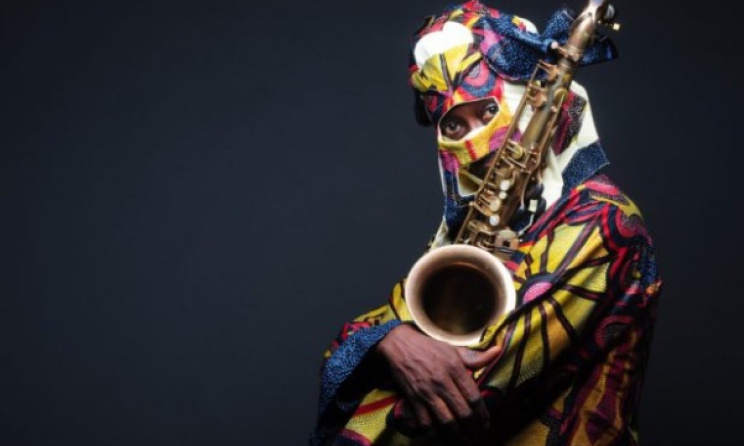Ten of the best: Lagbaja
It is now 20 years since masked Nigerian artist Lagbaja established his Motherlan' club in Lagos, Nigeria. His brand of jazz-infused Afrobeat involving the heavy use of Yoruba drums such as bata and sakara was for some time the most popular reincarnation of Fela’s sound. Dede Mabiaku was truer to the Afrobeat brand, as created by the iconoclastic Fela Anikulapo Kuti, in dance, dress and mannerisms. His sons, Femi and Seun Kuti, were more faithful to its militant spirit. But it was Lagbaja’s comic offerings that kept the genre alive in the minds of a young generation of music enthusiasts.
 Lagbaja. Source: Washingtonpost.com
Lagbaja. Source: Washingtonpost.com
Lagbaja hasn’t produced a critically acclaimed body of work in the order of his 2000s glory in a while. But his catchy hooks and use of humour were part of the easily recognisable music models during a period that saw the rapid growth of different shades of Nigerian contemporary pop music.
His willingness to experiment – performing in a style he tagged as 'Africano' music – also made him one of the few artists to attain popular acclaim while producing what would today be classified as alternative music. Lagbaja also balanced levity with social responsibility, something that has now become a lost art.
From his release of Ikira and Lágbájá in 1993, Lagbaja’s songs have always occupied a key place in Nigerian contemporary music. Below are 10 of his best, in no particular order.
Baby Tani ko fe wa
This was one of Lagbaja’s most popular numbers of the 1990s and the introduction to omo baba mukomuko (the song of the pap-drinking man) for many millennials. It’s a taunt at a woman who rejects the singer’s advances, and is thematically reminiscent of Bobby Benson’s Taxi Driver.
Never far away
This is one of the best love songs out of Nigeria. It’s also represents the height of Lagbaja’s combination of strings and drums. The music video was the winner of the 2006 Channel O Music Video Awards for Best Male Video.
A o merin j'oba
A o merin joba (we’ll make the elephant king) is based on a Yoruba folktale that cautions against fame. It’s a fine display of Lagbaja’s musical roots and features a switch between a purely highlife verse and a chorus done in the woro beat of the original folk song – a merging of the old and new that became the masked one’s signature.
Konko below
‘Konko Below’ has everything: a signature dance, a memorable bata (drum) line and a simple hook. It was a song made for 'virality' before that became a word.
Gra Gra
This comedic song took gra gra, the pidgin expression for stubborn aggresiveness, and redefined it in ways that meant people started to sing it rather than just say it.
Emi Nlo
Lagbaja, beyond his music, will also be remembered for his fruitful collaborations with his soloists, who offered his songs the vocal quality that his own hoarse voice lacks. Yinka Davies, his first vocalist, is a legend of Nigerian music in her own right, and her performance of ‘Emi Nlo’ is an example of her vocal prowess.
Skentele Skontolo
There was an argument at the time of the release of Africano...The Mother of Groove about how Lagbaja’s departure from the pidgin that had defined the midpoint of his career would fare with his audience. The successes of songs like and ‘Never Far Away’ and ‘Skentele Skontolo’, an expression describing the grandness of the gele (headgear), made those hot takes quickly irrelevant.
Suuru Lere
Lagbaja became more socially conscious as his career became more mainstream, and at the height of his success, ‘Suuru Lere’ (patience is rewarding) was his ultimate political message. The video of the song was done in 2-D animation that along with the video for Weird MC’s 'Ijoya' was unique during a time when Nigerian music videos became more daring.
Nothing for you
Before ‘Never Far Away’ became Lagbaja’s best love song, this funny tale about a man wooing a girl much younger than him was arguably his most popular love song. But it’s really not a love song, as it is useless in serenading a lover. Instead, it’s about a man’s strive to attract a woman, which, if it were released today, would be severly parsed for consent and persistence.
Vernacular
Lagbaja’s music owes a lot to Fela’s genius. And this song, featuring samples of Fela's words, is a manifesto for the right to use our local languages the way we desire, and a homage to the Afrobeat legend’s activism.



























Comments
Log in or register to post comments